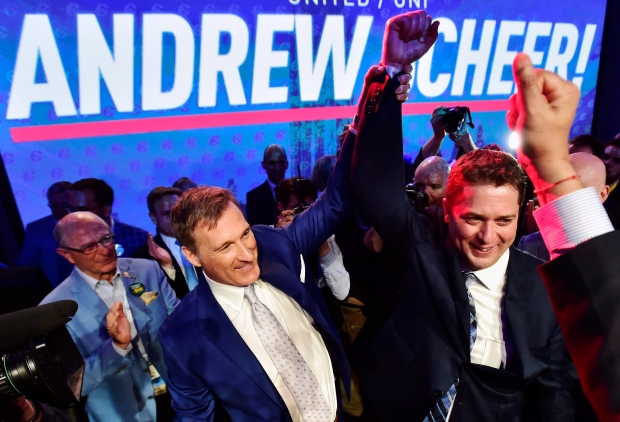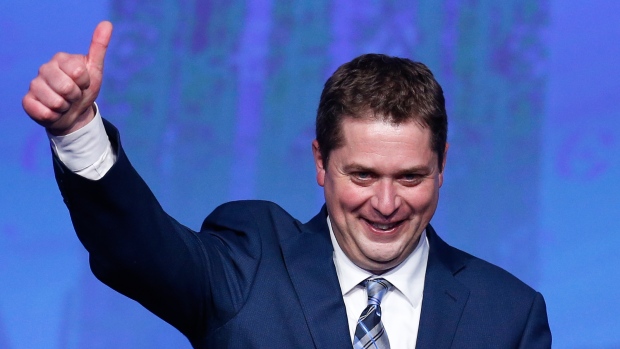Standing at centre stage, Andrew Scheer looked out at members of the Conservative Party assembled at the Toronto Congress Centre, raised his eyebrows, let out a small breath and smiled.
In seeking Stephen Harper's successor, Conservative supporters flirted with a bombastic star of reality television, and very, very nearly went with a dapper neoliberal who proposed a dramatic agenda of free-market economics.
But in the end, there was Scheer, a man who is happy to be described as "Stephen Harper with a smile."
"It wasn't our policies that cost us the last election," Scheer has said. "When I went door to door in my own riding, when I talked to candidates that ran for us but lost, or MPs that lost their seat, a recurring theme is that they heard time and time again that, 'You know, I like you and I like what you've done, but I just can't vote for you the next time.'
"And that's what I'm trying to address. I'm trying to change the presentation of our party, what it means to be Conservative, the impression that Canadians have when we talk about Conservative policies. I want it to be a positive impression."
- Andrew Scheer elected new Conservative leader
- LIVE BLOG RECAP | Andrew Scheer vows to support free speech after Conservative leadership win
So if Conservatives lost in 2015 because Harper didn't smile enough, or if a plurality of Canadian voters will soon want their old Conservative government back, then Scheer's arrival to the leadership of the Conservative Party on Saturday will seem to have been the smart choice.
In the moment, the longtime Saskatchewan MP and former House Speaker might seem to simply be the safe choice or the easy choice.
Though there is often much to be said for playing it safe.
O'Leary bailed, Bernier fell short
For a good deal of the race, Kellie Leitch seemed to dominate the conversation.
And by the telling of Kevin O'Leary's campaign manager, Scheer might only be leader of the Conservative Party because O'Leary realized he didn't want the job.
For that matter, up and until Scheer's name was splashed across the screen at the front of a tightly packed room at the convention centre in suburban Toronto, it seemed as if Maxime Bernier would get O'Leary's vacated throne.

Scheer, right, is congratulated by Maxime Bernier after he squeezed by Bernier by one percentage point on the final ballot. (Frank Gunn/Canadian Press)
On Friday, Bernier's campaign distributed a one-page biography of his partner, Catherine Letarte — the sort of information that, with all due respect to Letarte, would only be relevant if she were about to become the partner of the leader of the Conservative Party.
When it was Bernier's turn to speak on Friday night, his remarks were short and perfunctory. He had apparently used his rehearsal time earlier in the day to practise the speech he would give in victory on Saturday night.
Bernier's support on the first ballot was hardly overwhelming: 28.89 per cent of the available "points" through which Conservatives choose their leader. But it seemed to position him well.
Scheer, of course, was even less overwhelming, 21.52 per cent. And Bernier maintained the lead for every subsequent round, until the last one.
What history might say about Scheer's chances
Whether Scheer ever becomes prime minister will depend a great deal on Justin Trudeau, on whether the Liberals can make enough of a mess by 2019 (or 2023) that Canadians feel it necessary to replace them.
Canadians are historically willing to give their governments a second or third chance. Not since 1935 has a one-term government with a majority been thrown out of office, and in that case, R.B. Bennett's Conservatives might have just been unlucky enough to govern through the Great Depression.
Andrew Scheer’s victory speech to Conservatives17:10
Lisa Raitt was fond of reminding Conservatives that Pierre Trudeau's Liberals nearly lost the federal election in 1972, evidence that members of the Trudeau family were not necessarily invincible. But, of course, the elder Trudeau ended up spending more than 15 years in the Prime Minister's Office, beating poor Bob Stanfield three times.
There is also the small matter of Scheer's leadership result.
Aside from being the last five prime ministers of this country, what Jean Chrétien, Paul Martin, Harper and Justin Trudeau have in common is that they all became leaders of their parties with decisive, first-ballot victories. Though never prime minister, former NDP leader Jack Layton was a one-ballot winner as well.
Opposite to that set of the five most successful party leaders of the last 20 years are Stockwell Day, who needed two ballots to win the Canadian Alliance leadership in 2002, Stéphane Dion, who was the first choice of 17.8 per cent of Liberal delegates in 2006, and Tom Mulcair, who received 30.3 per cent of support on the first ballot at the NDP leadership convention in 2012.
The lesson might be that if party supporters aren't sure about who should lead them, they shouldn't expect the general public to be much more enthusiastic.
But then Scheer just demonstrated that not everything in politics unfolds in a predictable way.
Where will Scheer lead Conservatives?
And maybe Bernier would have been a risky choice.
Bernier's tax proposals were described as "unworkable" by Harper's former senior policy adviser, and a sufficient number of Conservatives apparently didn't have the stomach for it, but he was also not quite repudiated.
Meanwhile, the two outspoken social conservatives on the ballot — Brad Trost, who said he would never march in a gay pride parade, and Pierre Lemieux — drew a combined first-round share of 15.7 per cent.
Leitch, who campaigned on the implicit notion that the social values Canadians hold dear are threatened by the potential immigration of unspecified individuals, received seven per cent of support on the first ballot.
In contending with all those varied interests, Scheer at least offers something of a blank slate.
Opposite to Bernier's aggressive vision for limited government, Scheer has dabbled in small measures.
He would exempt home energy prices from federal sales taxes. He wants to put the flags of foreign countries on gas pumps to remind Canadians that their oil comes from other countries. He wants to use federal funding to defend free speech on university campuses. He, like every other Conservative save Michael Chong, is categorically opposed to the "Liberal carbon tax," which is he calls nothing but a "cash grab."
Conservatives are, if nothing else, very clear about what they don't like about Justin Trudeau: the selfies, the spending and so forth. And they have fond memories of what they did (or didn't do) while in government.
And what Harper left behind seems relatively sturdy. Even if the former Conservative leader didn't smile enough, Canadians elected 99 Conservative MPs in 2015. And the party is still raising more money than the Liberals.
Now the Conservatives have an amiable, boyish leader. He even has dimples.
Maybe that's enough. Or maybe the other option seemed like too much.
To encourage thoughtful and respectful conversations, first and last names will appear with each submission to CBC/Radio-Canada's online communities (except in children and youth-oriented communities). Pseudonyms will no longer be permitted.
By submitting a comment, you accept that CBC has the right to reproduce and publish that comment in whole or in part, in any manner CBC chooses. Please note that CBC does not endorse the opinions expressed in comments. Comments on this story are moderated according to our Submission Guidelines. Comments are welcome while open. We reserve the right to close comments at any time.
Note: The CBC does not necessarily endorse any of the views posted. By submitting your comments, you acknowledge that CBC has the right to reproduce, broadcast and publicize those comments or any part thereof in any manner whatsoever. Please note that comments are moderated and published according to our submission guidelines.


















